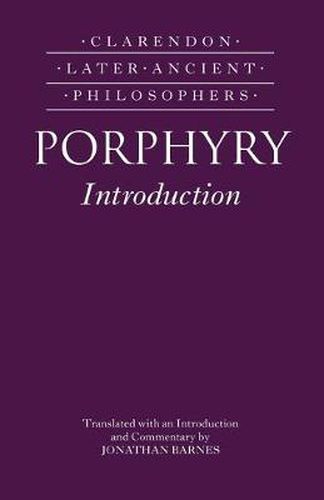Readings Newsletter
Become a Readings Member to make your shopping experience even easier.
Sign in or sign up for free!
You’re not far away from qualifying for FREE standard shipping within Australia
You’ve qualified for FREE standard shipping within Australia
The cart is loading…






The Introduction to philosophy written by Porphyry at the end of the second century AD is the most successful work of its kind ever to have been published. It was translated into most respectable languages, and for a millennium and a half every student of philosophy read it as his first text in the subject. Porphyry’s aim was modest: he intended to explain the meaning of five terms, ‘genus’, ‘species’, ‘difference’, ‘property’, and ‘accident’ - terms which he took to be important to Aristotelian logic and metaphysics, and hence to philosophy in general. Thus in principle the Introduction is simple and elementary. In fact, there are sometimes difficulties and doubts on the surface of the text - and beneath the surface there are frequent depths or profundities. The work raises, directly or indirectly, a number of perennial philosophical questions. In addition, the Introduction became, in Boethius’s Latin translation, the point of reference for one of the longest-lasting of philosophical disputes - the dispute over the status of ‘universals’. This book contains a new English translation of the Introduction, preceded by a study of the life and works of Porphyry, the purpose and nature of the Introduction, and the history of the text. It is accompanied by a discursive commentary the primary aim of which is to analyse and assess the philosophical theses and arguments which the Introduction puts forward. (But there are also numerous notes of a more philological or historical turn.) The twentieth century turned away from Aristotelian logic, and the Introduction lost its position on the syllabus. Barnes does not argue that it should be put back in its old place; but his commentary - the first to be published in English, and the fullest to be published for a century - suggests that there is blood in the old man yet. CLARENDON LATER ANCIENT PHILOSOPHERS General Editors: Jonathan Barnes and A. A. Long This series, which is modelled on the familiar Clarendon Aristotle and Clarendon Plato series, is designed to encourage philosophers and students of philosophy to explore the fertile terrain of later ancient philosophy. The texts range in date from the first century BC to the fifth century AD, and will cover all the parts and all the schools of philosophy. Each volume contains a substantial introduction, an English translation, and a critical commentary on the philosophical claims and arguments of the text. The translations aim primarily at accuracy and fidelity; but they are also readable and accompanied by notes on textual problems that affect the philosophical interpretation. No knowledge of Greek or Latin is assumed.
$9.00 standard shipping within Australia
FREE standard shipping within Australia for orders over $100.00
Express & International shipping calculated at checkout
The Introduction to philosophy written by Porphyry at the end of the second century AD is the most successful work of its kind ever to have been published. It was translated into most respectable languages, and for a millennium and a half every student of philosophy read it as his first text in the subject. Porphyry’s aim was modest: he intended to explain the meaning of five terms, ‘genus’, ‘species’, ‘difference’, ‘property’, and ‘accident’ - terms which he took to be important to Aristotelian logic and metaphysics, and hence to philosophy in general. Thus in principle the Introduction is simple and elementary. In fact, there are sometimes difficulties and doubts on the surface of the text - and beneath the surface there are frequent depths or profundities. The work raises, directly or indirectly, a number of perennial philosophical questions. In addition, the Introduction became, in Boethius’s Latin translation, the point of reference for one of the longest-lasting of philosophical disputes - the dispute over the status of ‘universals’. This book contains a new English translation of the Introduction, preceded by a study of the life and works of Porphyry, the purpose and nature of the Introduction, and the history of the text. It is accompanied by a discursive commentary the primary aim of which is to analyse and assess the philosophical theses and arguments which the Introduction puts forward. (But there are also numerous notes of a more philological or historical turn.) The twentieth century turned away from Aristotelian logic, and the Introduction lost its position on the syllabus. Barnes does not argue that it should be put back in its old place; but his commentary - the first to be published in English, and the fullest to be published for a century - suggests that there is blood in the old man yet. CLARENDON LATER ANCIENT PHILOSOPHERS General Editors: Jonathan Barnes and A. A. Long This series, which is modelled on the familiar Clarendon Aristotle and Clarendon Plato series, is designed to encourage philosophers and students of philosophy to explore the fertile terrain of later ancient philosophy. The texts range in date from the first century BC to the fifth century AD, and will cover all the parts and all the schools of philosophy. Each volume contains a substantial introduction, an English translation, and a critical commentary on the philosophical claims and arguments of the text. The translations aim primarily at accuracy and fidelity; but they are also readable and accompanied by notes on textual problems that affect the philosophical interpretation. No knowledge of Greek or Latin is assumed.